To ensure the most comfortable environment, what is the ideal humidity level for a home with air conditioning? This is a question that many homeowners ask. While there is no one answer that fits all homes, there are some guidelines that can help you maintain a comfortable and healthy humidity level in your home. Read on to learn more about what humidity levels are ideal for homes with air conditioning and how to achieve them.
What Is Humidity?
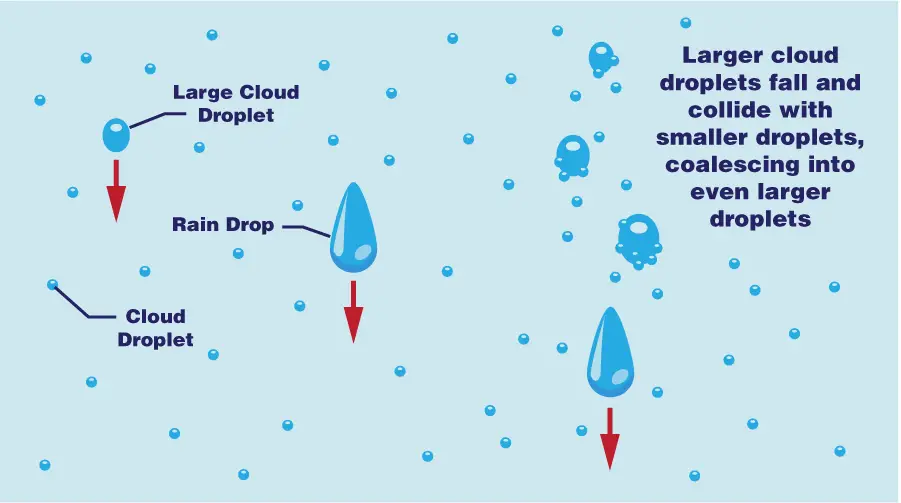
Humidity is the amount of water vapor in the air. It affects temperature, comfort levels, and health. Too much humidity can make a room feel stuffy and lead to mold growth. Too little humidity can cause irritation to eyes and respiratory systems, as well as mouth dryness. [1]
What Is The Ideal Humidity For A Home with Air Conditioning?
When it comes to air conditioning and humidity levels in the home, there are many factors to consider. The ideal humidity level for most homes with air conditioning is between 30-50%. Anything below or above this range can cause issues such as excess condensation collecting on windows, stale air, and a breeding ground for dust mites and other allergens. If the humidity is too high, it can also result in musty odors or even mold growth.
Maintaining an ideal level of humidity helps prevent these problems while also keeping your family comfortable. Air conditioners help reduce humidity by removing moisture from the air as they cool it down. Some newer AC units come equipped with sensors that measure the relative humidity indoors, allowing you to adjust the settings accordingly.
It is important to note that humidity levels and temperatures should work together in a home with air conditioning. Lower humidity can make it feel colder, while higher humidity can make it feel warmer.
Overall, the ideal humidity for a home with an air conditioner is between 30-50%. Keeping this range in mind when adjusting your thermostat will help you create a healthy indoor environment without sacrificing comfort. By managing relative humidity levels along with temperature, you can enjoy better overall air quality and long-term savings on energy bills. [2]
How Long Do Dehumidifiers and HVAC Services Last?
Most dehumidifiers are designed to last between 8-10 years, depending on the make and model. However, with regular maintenance and cleaning, they can last up to 15 years or more. HVAC services typically need an annual tune-up and should be replaced every 10 years or sooner if there are any significant problems. Regularly changing air filters is also important for keeping your system running efficiently.
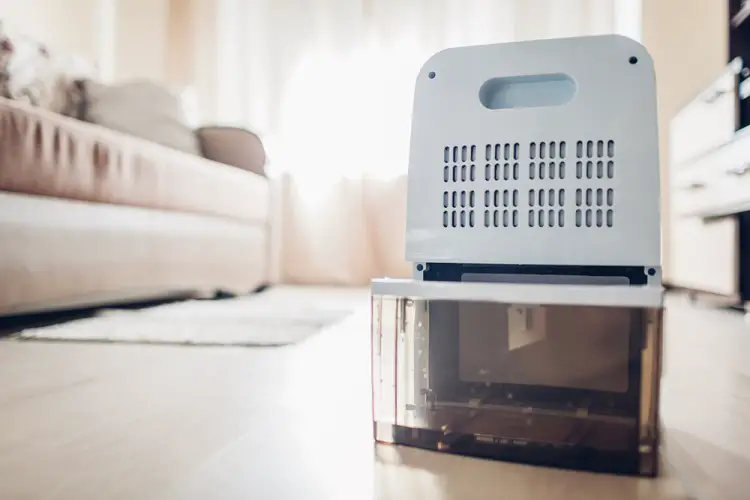
With proper care and maintenance, you can extend the life of both your dehumidifier and HVAC systems considerably. Additionally, regular maintenance will ensure that your home’s humidity levels remain at a healthy level all year round. [3]
How Long Does Attic Insulation Last?
Attic insulation is an important part of your home’s overall energy efficiency. Properly installed and maintained insulation in the attic helps to regulate the temperature inside and can drastically reduce energy costs by keeping cool air in during summer months and hot air out during winter months.
But how long does this insulation last? The life span of attic insulation will depend on several factors including what type of material was used, its quality, how it was initially installed, and if it has been maintained properly over time. Generally speaking, loose-fill or blown-in cellulose or fiberglass insulations have a lifespan of around 20 years while rigid foam panels typically last between 25 and 40 years.
In addition to the type and quality of the insulation material, another factor that will affect its longevity is indoor humidity levels. Attic insulation can become saturated with moisture if relative humidity in the home is too high, which can reduce its effectiveness by up to 50%. To ensure proper attic insulation performance, maintain humidity levels at 40-60% inside your home using a dehumidifier or air conditioner.
This will keep attic insulation dry which will help extend its life span. [4]
What Else Affects Humidity Levels In Your House?
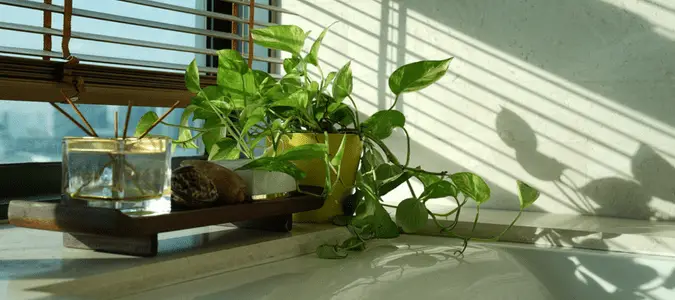
Leaky Pipes
Leaky pipes are one of the biggest culprits behind high indoor humidity. When water accumulates in your home, it increases the relative humidity levels. Look for leaking fixtures, such as faucets and toilets, and repair them as soon as possible to reduce excess moisture in the air.
Long Showers
Taking long showers can increase the moisture levels in your house significantly. To reduce humidity levels, try to take shorter showers.
Houseplants
Having house plants is a great way to add life to any home, but they also contribute to high indoor humidity and airborne allergens. Make sure you regularly clean and dust your plants to minimize their impact on your home’s air quality.
Unvented Gas Heaters
Unvented gas heaters produce moisture as a by-product of combustion and can affect the relative humidity of the air inside your home if they are not vented properly. Be sure that any unvented gas heater you use is ventilated according to manufacturer instructions. [5]
How To Decrease Humidity In Your Home
Perform Regular Maintenance On HVAC System
It is important to have your heating, ventilation and air conditioning (HVAC) system regularly serviced by a professional. The technician can help keep the system running efficiently which will help reduce indoor humidity.
Reduce Shower Time
Long showers add moisture to the air in your home. Try taking shorter showers or investing in an exhaust fan that turns on when you shower and runs for 15 minutes after you’re finished.
Check Doors & Windows For Drafts
Leaky windows and doors let outside air into your home, which adds more humidity inside. Make sure all window seals are weatherproofed and check for any drafts coming from door frames or around window frames.
Use A Dehumidifier
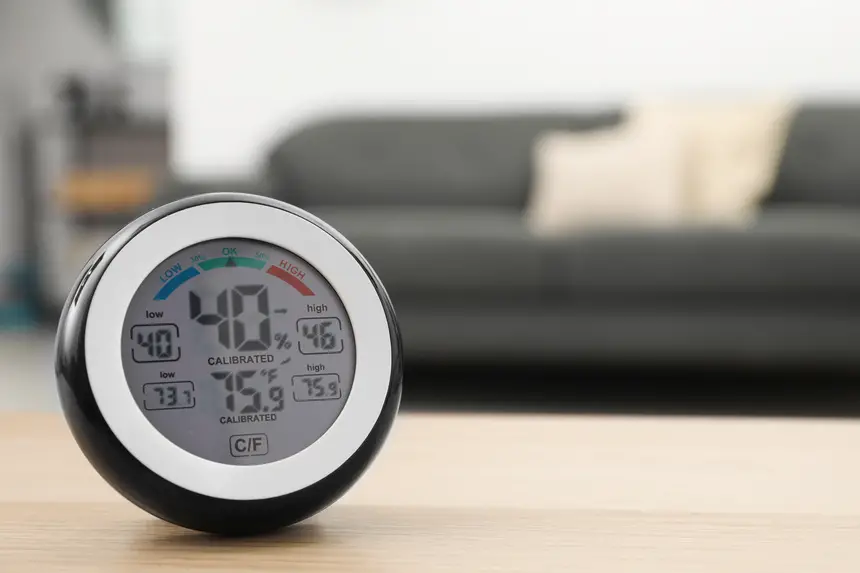
The most effective way of reducing humidity in your home is to use a dehumidifier. Dehumidifiers remove moisture from the air and can help you maintain a healthy relative humidity level in your house.
Keep Houseplants To A Minimum
Houseplants need water to survive, which releases moisture into the air when you water them. Try to keep the number of plants around your house minimal if you want to reduce extra humidity in your home.
Use An Air Conditioner
Air conditioners work by cooling the air inside your home. This helps to reduce overall temperature as well as reduce indoor humidity levels. Make sure that you regularly clean or replace filters on your AC unit to ensure it is operating at optimal efficiency.
Open Windows
Air circulation is key to reducing indoor humidity levels. To reduce excess moisture in your home, open windows and doors as much as possible to allow fresh air to circulate throughout the house. This will also help you save on energy costs by not having to use your air conditioner or dehumidifier all the time.
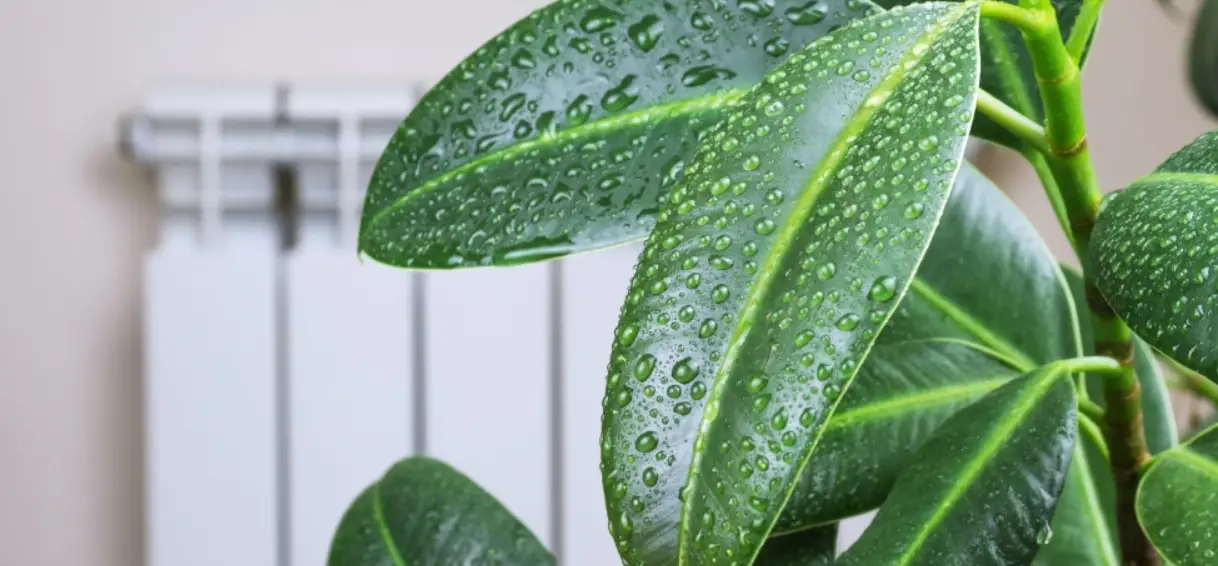
Monitor Humidity Levels
The best way to make sure that your humidity levels are within a healthy range is to monitor them regularly with a hygrometer. Hygrometers measure relative humidity percentage in the surrounding area and can help you determine if you need to take any additional steps for decreasing the moisture content in your home.
Install A Radiant Barrier In Your Attic
Radiant barriers stop heat from entering your home and can also help reduce humidity levels in the summer. Radiant barriers are installed between the roof rafters to reflect heat away and keep it out of your living space. This will help to lower indoor temperatures, as well as reduce high humidity levels.
With these tips, you should be able to maintain a healthy level of humidity in your home with air conditioning. However, if humidity levels remain persistently high, contact an HVAC professional for advice on how to further decrease moisture indoors. [6]
How Does Humidity Affect Mold Growth?
Mold growth relies heavily on high humidity levels in order to thrive. Humidity that is higher than 60% presents the perfect environment for mold spores to grow and reproduce rapidly. This can cause a range of health issues, including allergies and asthma attacks. In addition, warm temperatures, dark spaces and damp conditions are all conducive to fungal growth.
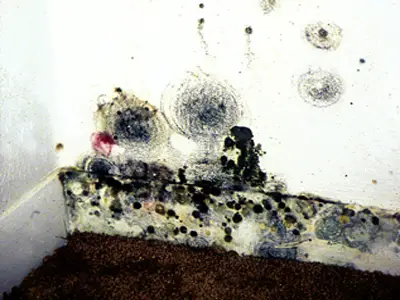
For that reason, it’s important to keep humidity low if you want to prevent mold from taking hold in your home or office. It is best practice to keep indoor relative humidity levels between 30-50%. If it goes above this range, be sure to take steps to reduce the moisture in the air in order to preserve air quality and minimize any potential damage or health risks posed by high humidity.
This can be done by using a dehumidifier, turning on air conditioning or opening windows to allow for cross ventilation.
Additionally, you may want to inspect any sources of water in the home for potential leaks and repair them promptly.
What Happens to My A/C When It’s Too Humid Inside?
When the humidity levels in your home are too high, it can lead to several issues with your air conditioning system.
First, when there is more moisture in the air, it makes it harder for your A/C unit to cool down your home. This causes the air conditioner to work longer and harder than necessary and could increase energy bills significantly over time.
Additionally, moisture buildup inside of an A/C unit can lead to mold growth as well as other potentially harmful microbial growth. This additional moisture also has a way of collecting on the evaporator coils, which could cause frosting or ice buildup.
All of these issues will add up and reduce your system’s efficiency and lifespan if not properly addressed. [7]
Types of Humidifiers You Can Use in Your Home
Besides adjusting the cooling system in your home, you may also want to consider using a humidifier. Humidifiers are devices that help maintain optimal humidity levels in the environment by introducing moisture into the air. There are several types of humidifiers available for use in homes, such as evaporative, ultrasonic, steam and impeller humidifiers.
Evaporative humidifiers work by drawing air through wet pads or filters and then adding moisture to it before circulating it back into your home. They’re generally quieter than other types of humidifiers and consume less energy. However, they can be prone to build up mold or bacteria if not cleaned regularly.
Ultrasonic humidifiers employ high-frequency sound waves to create a mist that is released into the air. They’re efficient and quieter than other types of humidifiers, but can be more expensive to purchase.
Steam humidifiers generate steam through heating water before adding it to the air in your home. They’re faster at raising humidity levels compared to other types of humidifiers, but they also require regular cleaning due to their tendency to accumulate mineral deposits from the water used.
Impeller humidifiers work by rotating discs that fling droplets of water into the air as vapor, which increases humidity levels quickly and efficiently. This type of humidifier is relatively easy and inexpensive to maintain, however noise can be an issue with some models.
Whichever type of humidifier you choose to use in your home, it’s important to keep a close eye on humidity levels. An ideal indoor humidity level should be between 40-50%. Too much or too little moisture in the air can lead to other issues such as mold growth, dust mite infestations, and static electricity.
It’s also important to regularly clean and maintain the humidifiers according to manufacturer instructions in order for them to function at their optimal levels.
Ultimately, adjusting the cooling system in your home along with using a humidifier will help ensure that you have comfortable air conditioning all year round.
FAQ
Why does my humidity go up when AC is on?
The most likely answer is that your AC unit is not properly sized for your home. An undersized unit will run continuously in an effort to cool your home, but will struggle to lower the temperature and humidity levels at the same time. This can cause the relative humidity in your home to rise, even with the AC unit running. If you think your AC unit may be undersized, the best course of action is to have a professional HVAC contractor come out to assess your situation and recommend the best options for you. They will be able to determine whether a new AC unit is necessary, or if there are other steps you can take to improve the performance of your existing unit.
What is ideal AC humidity?
The ideal relative humidity level for a home with central air conditioning is between 40 and 60 percent. Higher levels of humidity can make your home feel muggy, while lower levels can cause dry air which can increase the risk of health problems such as asthma or allergies. Maintaining ideal humidity levels will also help to keep energy costs down, since it takes less energy to cool a room at an optimal humidity level than at an excessively high humidity level.
Is 65 humidity too high in a house?
The ideal humidity level in a house with air conditioning is between 30-50%. Humidity levels higher than 65% can create an uncomfortable environment, increase the risk of dust mites, and make it difficult for air conditioners to cool your home effectively. If you find the humidity in your home is above 65%, consider investing in a dehumidifier or other tools to help reduce it.
Additionally, avoid activities that will contribute to elevated humidity, such as drying clothes indoors or running hot showers for long periods. Proper ventilation and regular maintenance of your air conditioning unit can also help keep humidity levels down.
Why is my AC not removing humidity?
If your air conditioner is not removing humidity from the air, there could be several reasons. It may need to be serviced or repaired, as it might have a refrigerant leak or an issue with its compressor. Alternatively, the filter may need to be replaced as it has become clogged and is no longer allowing airflow.
Additionally, if your home’s humidity levels are too high, you won’t get the cooling effect you desire because when there is more moisture in the air, less heat can be removed. In this case, investing in a dehumidifier would help reduce overall humidity levels and make your AC more effective. It’s important to keep indoor humidity levels at comfortable and healthy ranges for optimal comfort and air quality.
Will lowering AC lower humidity?
The answer is yes, in most cases. As the temperature of the air drops, the humidity level inside your home should also decrease. If you are using a central air conditioning system with a dehumidifier, this can help to reduce indoor relative humidity levels even more.
Additionally, if you use a humidifier or have plants in your home that increase moisture levels, then lowering the AC may not be enough to reduce humidity on its own.
What should air conditioner humidity be set at in summer?
Generally speaking, when using an air conditioner during the summer months you should aim to maintain indoor relative humidity levels between 40-50%. Too much humidity in your home can not only make you feel uncomfortable but also cause problems like mold growth. If this is the case, then you should lower your AC’s temperature and/or increase the fan speed to further reduce humidity.
Additionally, using a dehumidifier in combination with your air conditioner can be more effective at reducing moisture levels than either one alone.
Useful Video: What’s the Best Humidity Level for Your Home?
Conclusion
When it comes to humidity in a house with air conditioning, the ideal relative humidity should be between 40-50%. This helps reduce dust and mold growth and allows for more comfortable indoor temperatures. Additionally, using a dehumidifier can help maintain optimal levels of moisture in the home, helping to create an even better indoor environment. Ultimately, monitoring humidity levels is key to ensuring that your home is as comfortable—and healthy—as possible.
Using a combination of air conditioning and a dehumidifier, you can have complete control over the indoor environment at all times. By maintaining an ideal level of relative humidity, you will make sure that your home stays clean and comfortable while also keeping it healthy for those inside.
References
- https://www.airthings.com/what-is-humidity
- https://www.mastermechanical.net/what-recommended-humidity-level-your-home
- https://www.hvac.com/humidity/hvac-coms-guide-to-dehumidifiers-faqs-cost-benefits-brands-more/
- https://www.reenergizeco.com/blog/replace-home-insulation/
- https://www.epa.gov/mold/what-are-main-ways-control-moisture-your-home
- https://www.huskyair.com/blog/reducing-indoor-humidity/
- https://gopaschal.com/air-conditioner-humidity-issues/





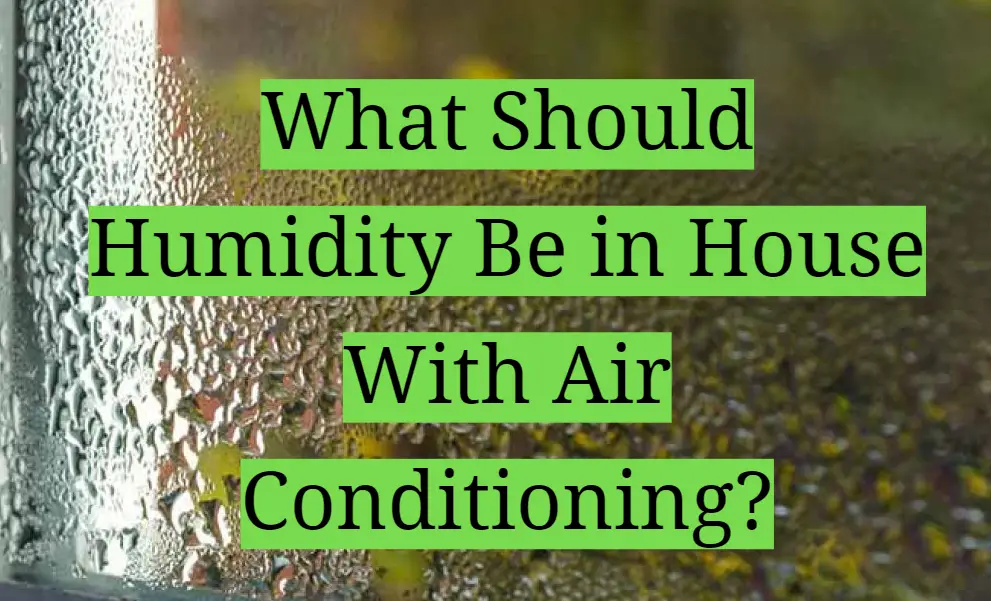








Leave a Reply